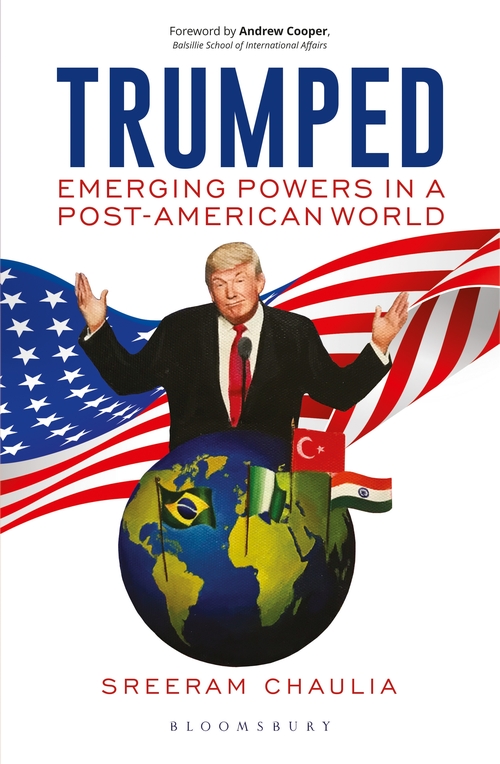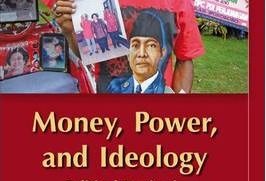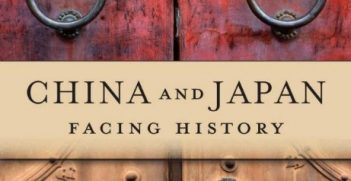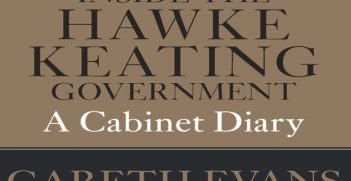Book Review: Trumped: Emerging Powers in a Post-American World

Trump’s “America First” policies have paved the way for regional powers to assert their own local agendas. Sreeram Chaulia examines how four of these states are faring.
The election of Donald J. Trump to the Presidency was always going to prove a stress test of the robustness of both the United States’ political institutions and academic theories about America’s role in the contemporary international order. Trump was manifestly underequipped, both intellectually and psychologically, to do the job properly. He was openly hostile to the political and bureaucratic establishments, which he and his enablers decried as the “deep state.” His business dealings had emmeshed him and his family in a series of at best complicated relationships with dubious financiers and politicians. And then there were his politics: a mishmash of prejudice and misconception, swirling around an apparent conviction that the world was now taking advantage of the US, stealing its wealth and vitality, and that Washington’s “globalist” elite was complicit in this perfidious assault on American greatness.
Outside the US, the big question back in early November 2016 was: what effect will a President like this have on an international order that we generally agreed is underpinned or upheld in some way by American power, money, and diplomatic skill and energy? It was obvious well before Trump’s inauguration that the answer was uncertain, partly because of the president-elect’s professed beliefs, and partly because of the people that gravitated into this team. Individuals like Michael Flynn, a soldier sacked by Barack H. Obama from the directorship of the Defense Intelligence Agency who then turned fixer for Turkish and Russian interests, did not inspire confidence. Nor, for that matter, did Flynn’s short tenure as Trump’s National Security Advisor in the early weeks of the administration, which culminating in his resignation, prosecution, and conviction.
For these and many other reasons, scholars and analysts predicted the Trump presidency would bring about significant changes in the international order the US helped uphold at least until his election and a realignment of the various regional orders around the world in which the US has played a role. Pessimists feared an unravelling of rules, norms, and tacit understandings, as stronger states long held in check moved to assert themselves in their regions. Optimists – some harking from those states – looked forward to a chance for the rules to be rewritten.
What has actually happened since Trump won office, as Sreeram Chaulia’s Trumped: Emerging Powers in a Post-American World makes clear, has defied both sets of predictions. There can be no doubt that this administration has done great damage to many key relationships, to institutions like the World Trade Organisation, and to America’s reputation – such as it ever was – as a reliable partner. And it is readily apparent too that some states have flexed their muscles, exploiting weaknesses in DC and in the US diplomatic establishment, attempting to reorder their immediate neighbourhoods. China’s effort to create an Indo-Pacific in which it sets the standards, exerts control over flows of goods and services in and out of its market, and above all, mutes criticism of the Communist Party has continued apace.
Beijing’s behaviour looms in the background of Trumped, but refreshingly, it is not the primary focus. Instead, Chaulia explores how four other regional powers – India, Turkey, Brazil, and Nigeria – have fared, as they try to manage a capricious President and further their own interests.
Chaulia tackles this task – not an easy one, given the literatures involved and all the drama that has engulfed most if not all of these states in recent years – with alacrity. He provides perceptive assessments of their leaders, who have had to manage Trump and find space to pursue their own agendas: Narendra Modi, Recep Tayyip Erdoğan, Jair Bolsonaro, and Muhammadu Buhari. He details too the ups and downs of the relationships each of their governments has had with Washington. And he assesses how far India, Turkey, Brazil, and Nigeria have succeeded in filling the partial vacuums created in their regions by the Trump administration’s incompetence, neglect, disinterest, and retrenchment.
Throughout, Chaulia displays a degree of sympathy with the populism of Trump and these regional leaders, as well as considerable scepticism about “globalism” and the way in which it has shaped US foreign policy. He welcomes both a supposedly less interventionist and intrusive US and a more multipolar world. But as the analysis shows – and Chaulia himself admits – it is far from clear that regional powers are capable of stepping up and providing the kinds of public goods the US and its allies have long supplied. In South Asia and the Indian Ocean region, Modi’s India has struggled to build the necessary capabilities and legitimacy to become a net security provider, and largely failed to bring down barriers to trade and investment. Erdoğan’s Turkey and Bolsonaro’s Brazil have fared even worse in their backyards. Sluggish economic growth and internal division have curtailed ambition and eroded capacity, as indeed they have in India. And in Turkey’s case, ill-advised and ever-escalating involvement in regional conflicts have exacerbated an already bad situation.
Trumped is a thought-provoking book, written with verve and energy. At its heart, though, is an unresolved tension. Chaulia welcomes Trump’s retreat from globalism and the resurgent nationalism on display in the US and the regional states on which he concentrates. He thinks we should welcome the multipolar world they are bringing into being. Yet at the same time, he envisages that world being regulated by stronger multilateral institutions and agreements, both regional and global – arrangements surely incompatible with the populist, nationalist, mercantilist, and crudely transactional preferences of our current crop of leaders.
Ian Hall is a Professor of International Relations and the Deputy Director (Research) of the Griffith Asia Institute at Griffith University. He is the editor of the Australian Journal of International Affairs.
This is review of Sreeram Chaulia, Trumped: Emerging Powers in a Post-American World (New Delhi Bloomsbury, 2019). ebook ISBN: 9789389165944.
This article is published under a Creative Commons Licence and may be republished with attribution.





